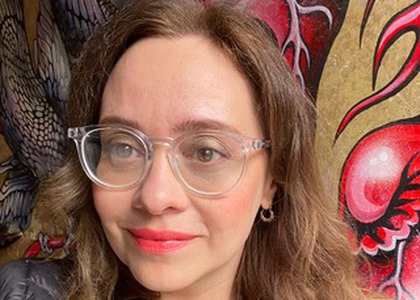> [Archived] Interviews

Interview with composer Sabina Ulubeanu
The final stage of the first edition of the National Composition Competition "Retracing Bartok" took place in Timișoara on Thursday, the 18th of May. Sabina Ulubeanu, who was a jury there, tells us more about the stages of this competition in an interview done by Ioana Țintea.
Sabina Ulubeanu, what did the National Composition Competition Retracing Bartok mean and how was the title reflected in the competition requirements?
I had the utmost pleasure of being able to organise a competition exactly as I would have liked when I was a young student, that being - having a finale with several competitors and their pieces to be performed by an ensemble such as the ATEM Ensemble, and these young people could be brought together and spend time, and work with the ensemble, and get to know each other and, at the end, have this great concert evening.
They were given a song from Bela Bartok's collection in facsimile - they also got to see Bartok's handwriting, and each of them reflected Bartok's collected song through the prism of their personality. Thus, we had everything from very energetic, driving works to works that timbrally experimented with the possibilities of instruments... a lot of courage... there were also works that contained passages of improvisation... Somehow, everyone went beyond their own style and manner of writing and we were really pleased to see that compared to the portfolios submitted for selection, they managed to progress and shape their ideas in a much more personal way.
The final round of the competition took place on Thursday, the 18th of May. What did the podium look like and what did you particularly appreciate as a jury?
First of all, I appreciated absolutely all the contestants for the qualities I listed above, but there were certain things that stood out in the winners. George Păiș took third place for a very energetic, very moving piece with a very well developed sense of timing and form. Second prize went to AriadnaEne Iliescu, who had a very brave work from a timbral point of view, with an exploration of the instruments in a very good and consistent way, in which she captured very well the spirit of the Bartok song chosen, which was sung by teenagers, and in her work she even said that she wanted to recreate the tumult of adolescence. First prize, Irina Perneș... was a work that was, somehow, the most formally clear, the most flowing and in which the emotional underpinning did not diminish for a single second.
It was very difficult to choose, but we were happy to be able to make this selection after a heated debate and everyone finally agreed. It was difficult because there were other very good competitors. Rubin Szabó from Cluj was perhaps the most daring in terms of texture and exploring the possibilities of the instruments, even though she is only in her first year of Composition. Bianca Popa had a particular melodicism that she explored in a different way than she had written before, more fragmented, more nervously. MihneaDragne, a superb start to the piece... a single note that was extremely varied, you didn't get bored for 2 minutes I thought was a very nice achievement. Andrei Petrache, also like that, with an extraordinary energy. Mara Prună, who studies in London although she is from Cluj, presented a work that was very much based on improvisation; she was very much appreciated for her courage. They all had some extraordinarily beautiful things to say and we hope to repeat this concert in the future.
How did the collaboration with the other juries go?
The other juries, various personalities - Lucian Ban, jazz pianist and composer, Mat Maneri, who is an absolutely fabulous improviser, violist from New York and the two of us, Gabriel Mălăncioiu and Gabriel Almași, professors at the University of Music in Timișoara. They were extremely serious, they managed to see beyond the score and to intuit the potential of each composer. The discussions were very nice, although some of them were contradictory, but we decided to give feedback to the contestants and everyone was very pleased that there was such an open jury, so keen to help these young people develop and succeed in composing better and better.
Will there be a second edition of the competition, or was it just a one-off event as part of the "Timișoara - European Capital of Culture" programme?
We don't know yet. We know for sure that we want to repeat the concert, but we don't know in the future. Alin Rotariu is the organizer of the Jazz Updates concert series; "Retracing Bartok" is one of the projects of this jazz support platform. He has a lot of ideas and resources and, who knows, maybe in the next few years we will have a competition based on a different theme.
Translated by Anca Cristina Georgiana Mihai,
University of Bucharest, Faculty of Foreign Languages and Literatures, MTTLC, year II
Corrected by Silvia Petrescu














